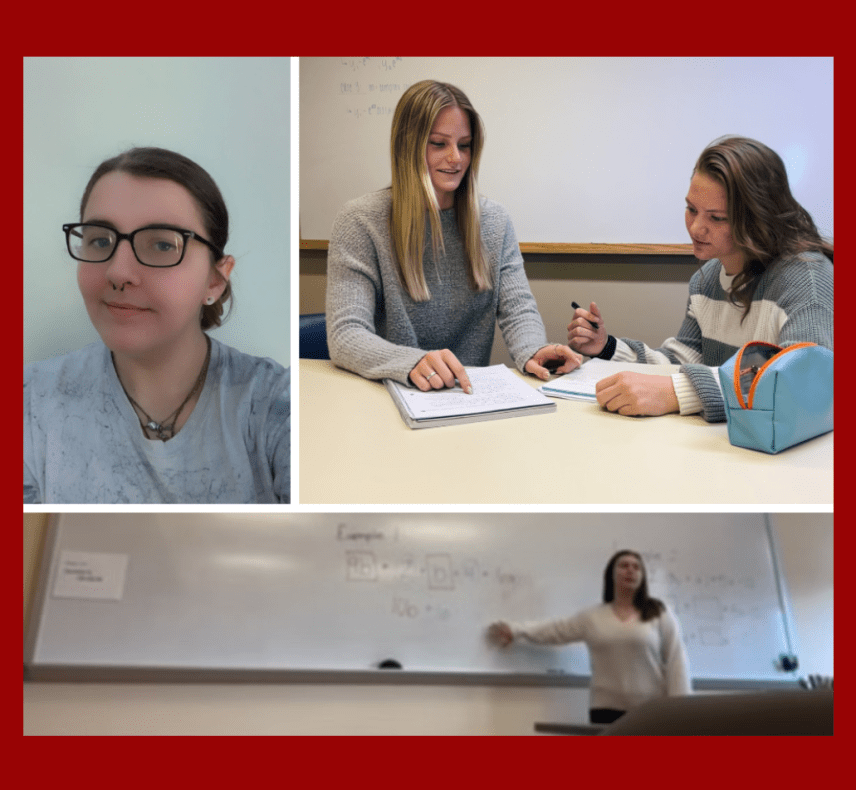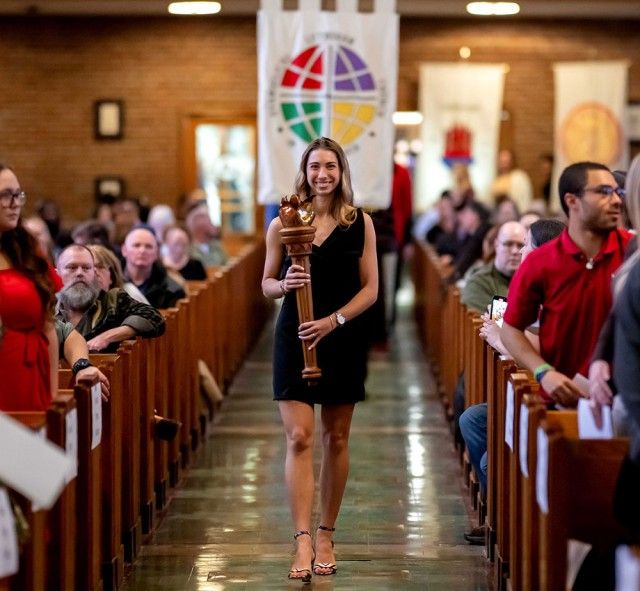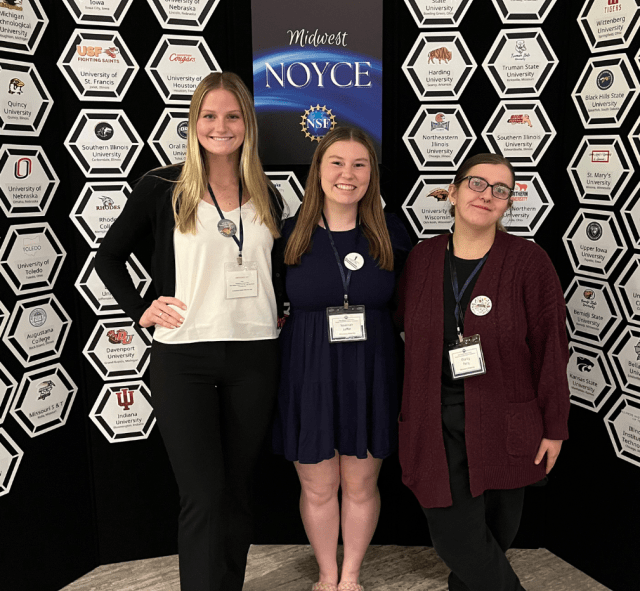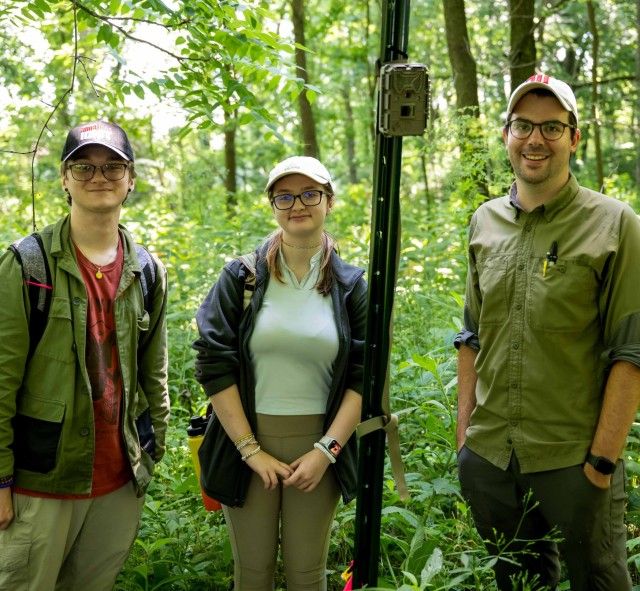Wittenberg ASCENT-STEM program recently awarded three scholarships through its new $1.2 million grant from the U.S. National Science Foundation’s Robert Noyce Teacher Scholarship Program. Recipients include McKenna Clark ‘26, Savannah LaMar ‘26, and Charity Perry ’25 who are all pursuing degrees as secondary STEM teachers. The effort includes partnerships with the Springfield City School District (SCSD), the Global Impact STEM Academy (GISA), and Clark State College (CSC).
The ASCENT-STEM program awards approximately $20,000 scholarships per year to junior and senior undergraduates who are working toward becoming secondary STEM teachers, demonstrating the importance of training highly qualified teachers. The program aims to incentivize undergraduate students to pursue STEM education in high-needs schools and develop support structures that ensure the long-term success of new teachers.
Led by Mike Daiga, associate professor of mathematics education, and Adam Parker, professor of mathematics, the ASCENT-STEM grant is an example of the out-of-the-box thinking that aligns with the Robert Noyce Teacher Scholarship Program.
All three students are already making an impact on the Springfield community with their interest in teaching STEM subjects and showing a true passion for helping students learn. Each are attending the Midwest Noyce Teacher Conference in St. Louis, Missouri, on Oct. 18 (today).
Part of the scholarship application included the students writing a two-page essay on the value of the Noyce Scholarship to their professional STEM teacher development.
“Writing the essay was a way for me to piece together all the reasons why I want to go into the field of education, specifically in a high-needs district,” said Clark, from Springboro, Ohio, who is majoring in math with a minor in education.
When she first learned that she was selected to receive the scholarship, she was immediately “scared that it was a mistake. After confirmation, I was overwhelmed with excitement and began to tear up…it felt so nice to be selected for such an amazing opportunity. I was with my dad when he looked at my self- service and saw that the scholarship had been applied to my account. He was the one who informed me that I had been awarded the scholarship, and he was so excited for me.”
Each year’s Noyce scholarship requires the recipient to teach in a high-needs district for two years per year of support; however, Clark plans to stick around for longer with hopes of returning to school to complete a master’s degree in mathematics and eventually teach advanced classes.
“Previous field experiences allowed me to speak about how I feel drawn to helping adolescents, especially the ones who have been externally set back from the start,” Clark said. “I want to show them that where they come from does not define them, and if they put in the work, they can achieve anything. It's not just about math, but about changing their mindsets and their lives.”
Clark, captain of the women’s swimming and diving team, is also a member of the Student Education Advisory Board, the National Society of Leadership and Success, the Wittenberg Green Club, the Student-Athlete Advisory Committee, the Student Alumni Association, and club volleyball. She is hoping to one day complete her Ph.D. and become a math professor. Even so, math wasn’t always her favorite subject until the encouragement of one teacher changed her perspective.
“Going into high school, I claimed that math was my least favorite subject,” Clark said. “In middle school, I was told that I was ‘unconsciously incompetent’ in math, so I decided to hate it. I went to a new school for high school, and it did not take me long to realize that not only was I good at math, but I also found it to be fun. My teacher was fresh out of college and was extremely motivated to prove to us that we were all capable of learning math. She was very encouraging and pushed me to find out that math was my favorite subject, not my least favorite. I want to be that teacher for my students. I know that I cannot make math everyone’s favorite subject, but I want to show them that if they put in the work, they, too can learn math. Math can be a scary subject, but I am willing to work with them to show all my students that they are smart and help them to find confidence in their abilities.”
Perry, who will graduate in spring of 2025, is a biology major pursuing a minor in education. Her plan is to teach AYA 7-12 Life Science and be a K-12 intervention specialist.
“My goal is to graduate with dual licenses in Life Science as a Biology major and as an Intervention Specialist and then teach in my hometown district,” said Perry, who is a Peer Mentor, a library circulation worker and a Parkhurst Dining employee, as well as a member of Alpha Phi Omega. “I have a close connection with my community at home, and I wish to give back to it.”
Perry, who was shocked and relieved to receive the Robert Noyce Scholarship, said that the scholarship allowed her to attend Wittenberg for her senior year.
“The first person I told was my mom, and she was extremely proud and happy for me,” said Perry, who is inspired in the education field daily because of her family.
“Most of my inspiration comes from my sisters,” she said. “I grew up with two disabled sisters, and they remind me every day how important it is to include them into the general school curriculum. I am excited to help students with disabilities learn biology. I believe any child is capable of learning even the hardest of subjects.”
LaMar, who will also graduate in 2026, is a math major pursuing a minor in education.
“I am honored and thankful to be selected for this scholarship and a little shocked,” said LaMar, who is involved with Alpha Xi Delta, WUSEA, Best Buddies, and the ASL club on campus, along with working in the Thomas Library and in the Office of Admission. She is also currently coaching a middle school volleyball team within the Springfield City School District.
“This is a huge deal, so I was so excited to receive this award. There were only three scholarships awarded at my University, so to be a recipient is so amazing,” she added. “After getting the phone call, I instantly ran to my parents to share the great news. My parents jumped up hugging me and congratulating me. They were so excited to hear all the information and so proud of me.”
For LaMar, writing the essay for the application process was easy and difficult at the same time.
“It was easy to write all of my goals for teaching down; however, writing the feelings that I experienced and want to portray to my students is difficult,” she said. “Teaching is a feeling that you get with your students and difficult to put into words. Teaching in a high-needs school district is where I feel I can make the greatest impact on students’ lives. I came from a high-needs school district and currently coach a middle school volleyball team at another high-needs school. These students need a steady person in their lives, a safe space, and someone to believe in them and encourage them to succeed. I want to provide that for these students. Coming from a high-needs school district myself, I know that these students need to be given a chance and show that someone cares about them inside and outside of the classroom. I want to do everything possible to make a positive impact.”
LaMar’s goals are to have a positive relationship with students, find unique ways to teach students, and support them in their own learning styles. She is planning to pursue a master’s degree while enhancing the learning experiences for English as a Second Language (ESL) learners.
“I am looking forward to a career dedicated to helping students learn math,” she said. “Most students feel like they aren’t good at math or just simply don’t like math. This drives my love for teaching math but in a way that they will understand. I want to give my future students a new perspective on math and show that they can succeed in my class,” she said.
Daiga and Parker are focused on setting up sustainable structures that will facilitate the creation of an effective pipeline of STEM educators. Their collaborative work includes the launch of a Learning Assistant (LA) Program, which will help foster co-teaching opportunities in introductory, active-learning STEM courses at Wittenberg. The project team will study the effectiveness of the LA program by comparing academic outcomes in courses that utilize LAs with their prior iterations that did not utilize LAs. Perhaps more importantly, the LA program will provide close mentoring relationships between professors and LAs on how to teach introductory content, or content they could also teach as future high school teachers.
Students who are interested in learning more about Wittenberg’s Robert Noyce Scholarship Program or becoming a Noyce Scholar, should click here.
About the Robert Noyce Teacher Scholarship Program
According to its website, the National Science Foundation’s Robert Noyce Teacher Scholarship Program provides funding to institutions of higher education to provide scholarships, stipends, and programmatic support to recruit and prepare STEM majors and professionals to become K-12 teachers. The program seeks to increase the number of K-12 teachers with strong STEM content knowledge who teach in high-need school districts. NSF encourages partnerships between four-year institutions and two-year institutions, providing pathways leading to STEM teacher certification.
Wittenberg’s ASCENT-STEM program is supported by the Robert Noyce Teacher Scholarship Program Grant No. 2344921. Any opinions, findings, and conclusions or recommendations expressed in this project are those of the author and do not necessarily represent the views of the National Science Foundation.







